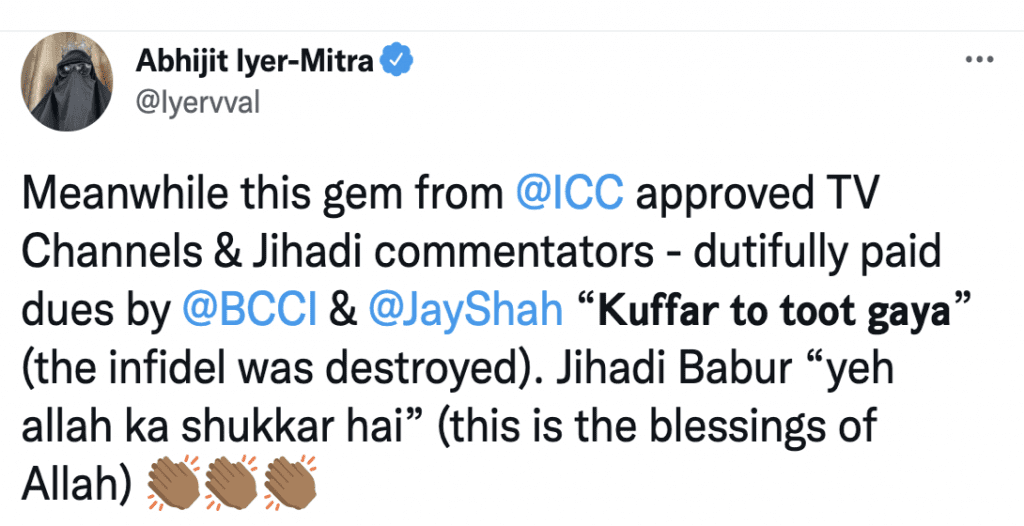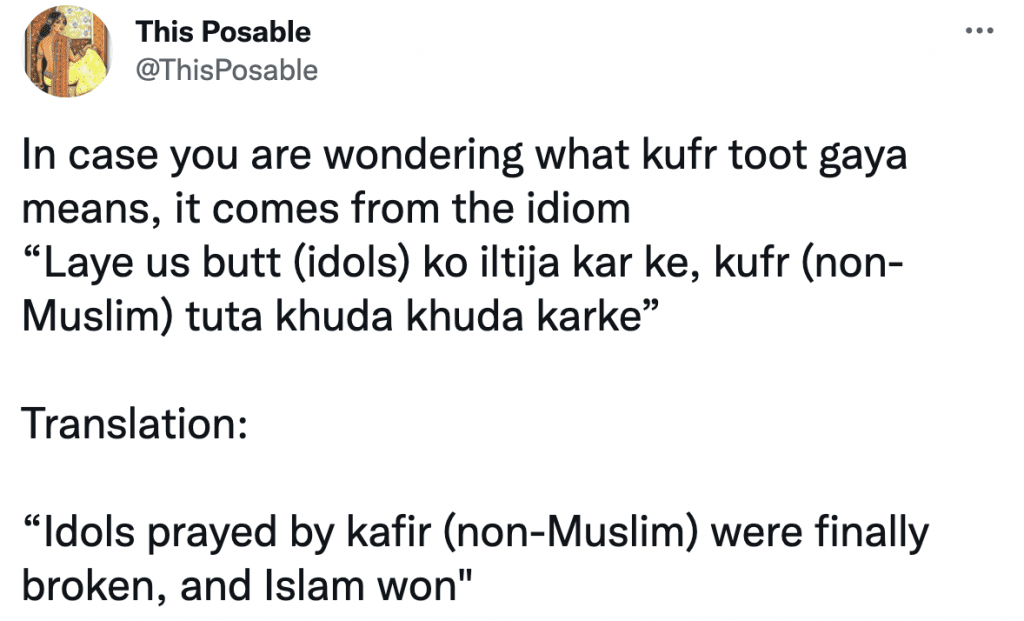
The T-20 cricket match between the archrivals India and Pakistan in Dubai on October 24, 2021, was in the news for the wrong reason. It was in the news not for the great game that it was; rather, it became newsy for the controversy created over the Pakistani commentator Bazid Khan’s remark in which he said in Urdu ‘Lekin kufr to toot gaya’ to describe how Pakistan broke World Cup jinx of losing to India.
Abhijit Iyer Mitra, a right-wing Twitter handle with over 100K followers, inserted the word kuffar in place of kufr and (mis) translated Khan’s words as ‘the infidel was destroyed’ and described him and the captain of Pakistan team Babur Azam as ‘jihadi’, an Islamophobic slur.


Other handles soon jumped on the bandwagon in calling it an attack on Hindus. Some even asked the International Cricket Council to suspend Bazid Khan for his remark.
According to Firoz Al-Lughat, an authoritative Urdu dictionary first published in 1897, the Urdu word kufr has two meanings—a literal and an idiomatic one. In the literal sense, it means ‘disbelief in God,’ which is the opposite of iman ‘belief in God’.
In the idiomatic sense, which is a metaphorical extension, the word also means zidd/hatt ‘stubbornness’, from which are derived two Urdu expressions, ‘kufr torna’ and ‘kufr tootna’ meaning ‘breaking stubbornness’. Both these expressions are listed in the dictionary as muhawara, idiom. The word kuffar which Mitra blatantly inserted in Khan’s phrase is the plural of kafir, disbeliever, an agentive noun derived from kufr.
This old Urdu idiom was distorted and misinterpreted by Mitra to launch an attack on Muslims, which later became a basis for an OpIndia report; other media outlets followed suit.
Mitra, in flagrant violation of the integrity of the source text, replaced Khan’s word kufr with the word kuffar, in his tweet “kuffar to toot gaya”, and then mistranslated it as “the infidel was destroyed”. As it is evident, Mitra strategically changed kufr meaning ‘disbelief’ and ‘stubbornness’ into kuffar meaning ‘infidels’ to forge the politics of hate.
The reason Mitra mistranslated it was political for the original word kufr wasn’t going to serve his Islamophobic goal. After inventing this new text through his vicious manipulation of the original, he cries foul and called it a jihadi attack which then becomes the basis of an attack on Muslims in general; other trolls on social media joined him in his campaign of hate. Soon Mohammad Rizwan, wicketkeeper-batsman of Pakistan, was attacked for celebrating his score of fifty in the form of performing sajda.
Many demanded Rizwan’s suspension from the team.
Interestingly, kafir the singular form of kuffar, is also used in Urdu metaphorically to mean ‘lover’ or ‘seductive/beautiful’, which is related to the zidd/hatt, the second meaning of kufr discussed above.
In the Urdu literary culture, the dignified beloved doesn’t reciprocate the expression of love too soon and keeps ignoring the lover to test his truthfulness. It is through this metaphorical connection that the beloved is described with the epithet kafir, meaning someone who is ‘stubborn’ in her refusal to believe the lover’s love. PanditDaya Shankar Naseem (1811-1845), a Hindu poet of Urdu from Lucknow beautifully uses the idiom kufr toota in his couplet:
laae us but ko iltija kar ke, kufr toota khuda khuda kar ke
“I brought my beloved home after earnest requests; her stubbornness was finally over”.
Here Nasim uses kufr toota as an idiom to mean that his beloved’s stubbornness was finally overcome, and she/he agreed to come with him. Mark also use the Urdu word but, literally meaning ‘idol.’ Idol is used here as a metaphor for the beloved.
In Urdu, many other attributes of the beloved such asher husn, ‘beauty’, ‘ada’, ‘moves/style’, ‘nigah’, ‘eyes’ are all described as kafir, which, contrary to what Mitra and his ilk may believe, signifies greatness of the beloved as it is held that the one who agrees to the lover’s expression of love too soon lacks elegance. In this sense, in Urdu I can express my deep love for cricket as yeh kafir cricket, mujhe research karne nahin dega ‘this enchanting cricket won’t let me finish my research.’
Gulzar Dehlavi, a famous Urdu poet used the word kafir to mean ‘attractive/seductive’ in ek kafir ada ne loot liya, unki sharm o haya ne loot liya ‘Her seductive style has stolen my heart, her bashfulness has won me over. This couplet will make no sense if the word kafir is translated as ‘infidel’.
It is worth noting that this Urdu usage is not confined to highbrow literature; it is also widely used in Bollywood songs. In the 1964 film Fariyaad, the Hindu lyricist Kedar Nath Sharma used the word kafir in this song, tune, teri nazar ne to kafir bana diya… ‘you and your gaze has made me a lover (of yours).
To return to Bazid Khan, as an Urdu commentator he used the Urdu idiom kufr to toot gaya meaning that the jinx is broken in the same sense as the poet Daya Shankar Naseem does in the example given earlier. As an Urdu speaker from India, I use the idiom in similar contexts where something desirable happens after a phase of struggle. Some Urdu speakers on Twitter offered corrections maintaining, naively as it became clearer later, that this could be due to misunderstanding of the idiom by non-Urdu speakers.
But the hateful propaganda based on the willful distortion and misinterpretations continued. One Twitter handles wrongly translated kufr in Pandit Naseem’s couplet as ‘non-Muslim.’ As if that wasn’t enough, he inserted the phrase “Islam won” to give it a violent anti-Hindu colour.


The larger political context within which commentator Bazid Khan’s statement was distorted and mistranslated cannot be ignored. Right after the match was over, Mohammad Shami, the only Indian Muslim bowler in the team was held responsible for India’s defeat against Pakistan and was singled out for a vicious online attack. He was called a traitor and was asked to go to Pakistan.
Other Hindu players who did not perform better in the game, including Rohit Sharma, who scored a duck, were not placed under scrutiny. Furthermore, just a couple of weeks ago the rightwing elements on the social media forced FabIndia to withdraw an ad that carried a slogan in Urdu ‘Jashn e Riwaaz’ meaning ‘Celebration of the Tradition’ because the use of Urdu words, somehow, ‘Islamized’ the Hindu festival of Diwali.
As a sociolinguist who studies Urdu and its social and cultural meanings in India, this incident coupled with the FabIndia controversy clearly shows how the language is manipulated and used as a tool to vilify and attack Muslims.
While, in the case of FabIndia it was the use of Urdu as a cultural symbol of Muslims that was chosen for the attack, in the case of Khan’s statement, it is the (mis)translation and (mis)interpretation of an Urdu idiom. In the case of the latter, the purpose was distinctly political to spread hate against Muslims and rob cricket off its cricketness.
Rizwan Ahmad is an associate professor of sociolinguistics at the College of Arts and Sciences, Qatar University.



